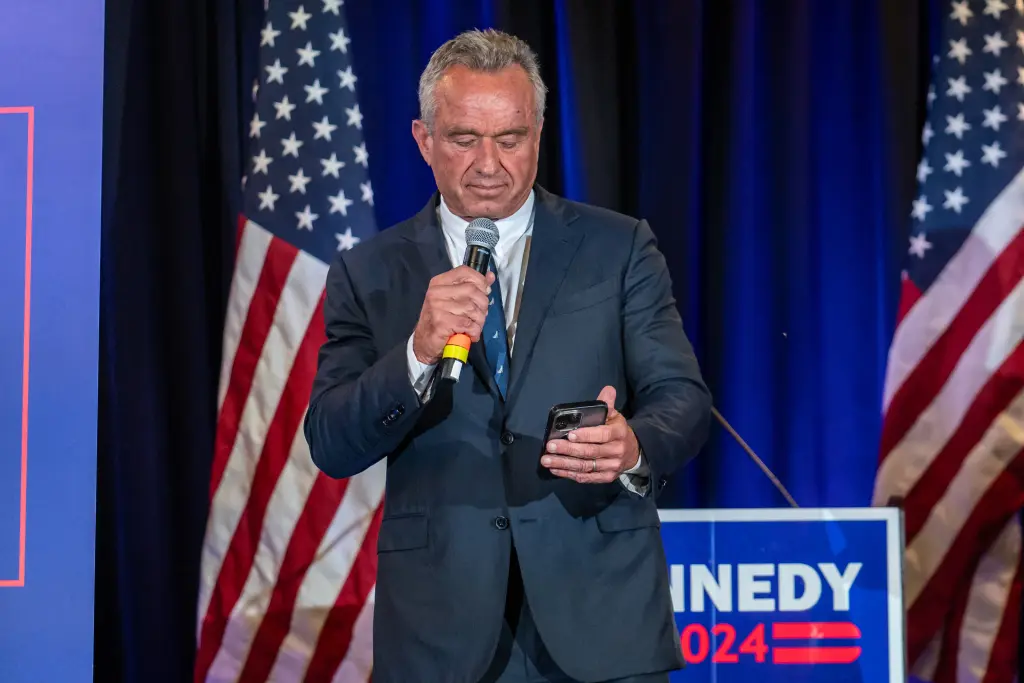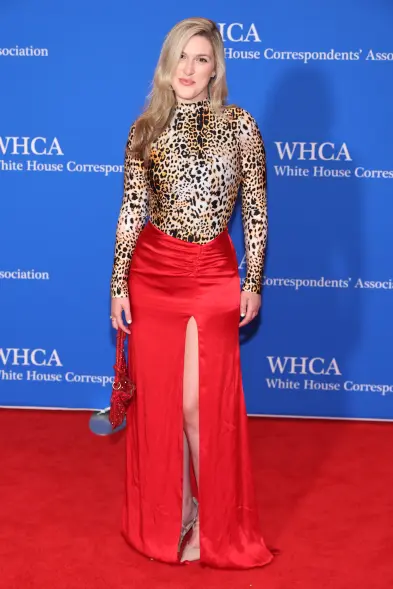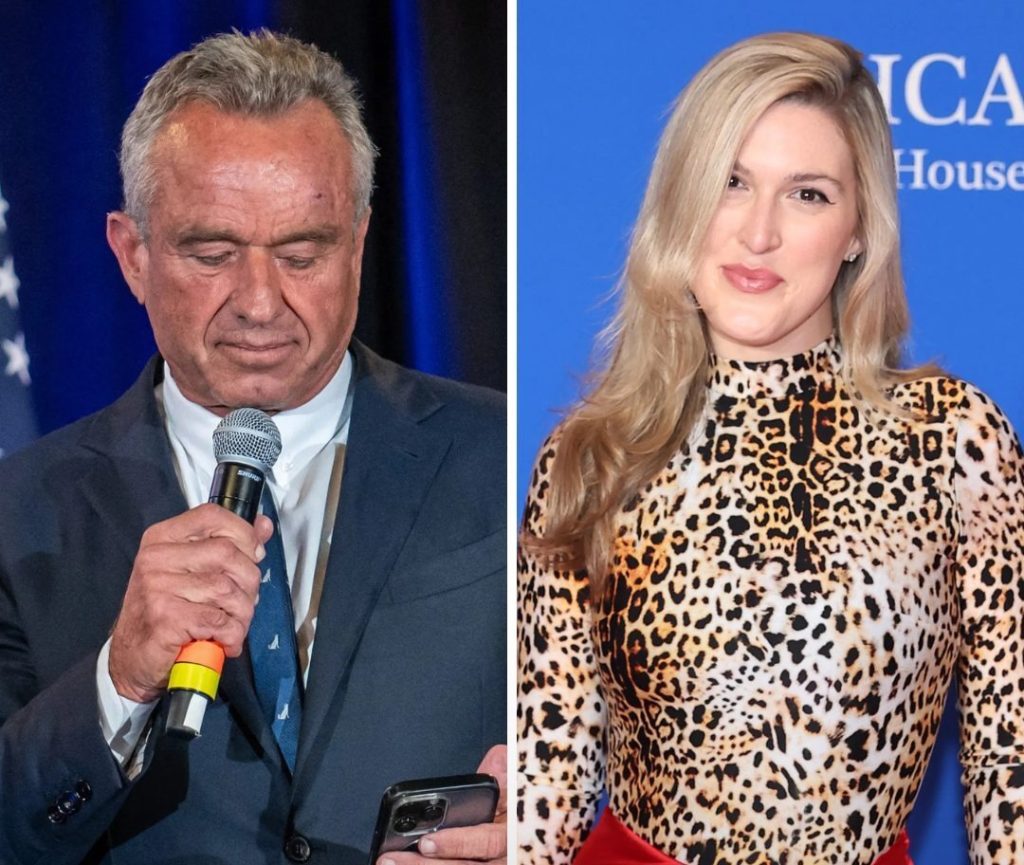Olivia Nuzzi’s memoir reveals RFK Jr.’s bizarre, self-focused response when their sexting scandal broke during his presidential campaign
Robert F. Kennedy Jr.’s 2024 presidential run was already one of the most unconventional and controversial campaigns in modern American politics long before whispers of a personal scandal escaped the shadows. But when news of his alleged sexting affair with journalist Olivia Nuzzi surfaced, it threatened to derail not only his candidacy, but also his carefully curated public identity as a renegade outsider challenging the political establishment. Now, in her upcoming memoir, Nuzzi is pulling back the curtain on what really happened behind the scenes — and her new revelations paint a far more complicated, unsettling picture than the public ever knew.

According to Nuzzi, who had been a high-profile political correspondent in Washington before her reputation imploded, Kennedy’s response to the unfolding scandal wasn’t marked by apology, panic, anger, or even surprise. Instead, she writes that he reacted with an emotion she didn’t expect: a strange, detached confidence. “If it’s just sex, I can survive it,” she claims he told her in September 2024, as the first reports of their racy exchanges began to circulate. In her telling, Kennedy appeared less concerned about the personal consequences than about whether the headlines would permanently tarnish the story he wanted to sell voters — a story of integrity, independence, and moral authority.
The alleged statement, if accurately recalled, is striking in its bluntness. Coming from a married man running for the highest office in the country, it suggests an acute awareness of political optics paired with a startling lack of reflection on the human cost. And that juxtaposition — self-interest alongside emotional detachment — is one of the core themes that threads through Nuzzi’s account. Her memoir, built on the fallout of the scandal that destroyed her own career, revisits the fraught dynamic that developed between the two during Kennedy’s campaign and the profound disconnect she witnessed when the story finally broke open.
At the time, Kennedy was gaining national attention with a platform rooted in anti-establishment rhetoric, vaccine skepticism, and a promise to disrupt the political norms upheld by both major parties. To his supporters, he was a crusader against institutional corruption. Critics argued that he was a dangerously polarizing figure, defined more by conspiratorial thinking than by actionable policy. His campaign was fueled by fervent enthusiasm from some corners and deep suspicion from others — the perfect environment for a personal scandal to erupt.

Nuzzi writes that she and Kennedy had engaged in an extended secret sexting relationship while she was still reporting professionally on Washington politics. The relationship, she admits, was a staggering lapse in judgment — both ethically and personally. She chronicles how their hidden digital exchanges spiraled into a scenario neither seemed fully equipped to handle, blurring boundaries between journalism and politics in ways that violated the very standards she had built her career on.
When the existence of their messages leaked, the story caught fire instantly. Nuzzi describes watching the news coverage unfold with a mix of dread and disbelief, knowing that her own name would be scorched into the narrative. But what stunned her, she claims, was Kennedy’s oddly analytical reaction. She writes that he treated the situation less like a personal breach of trust and more like a campaign crisis that needed to be evaluated for damage — almost as if he believed the scandal could be contained simply by framing it in the least threatening political terms.
“If it’s just sex, I can survive it,” he allegedly told her over the phone, as his team braced for the media storm. The phrase echoed through her mind long after the call ended. To Nuzzi, it was a signal of how Kennedy viewed the situation: not as a betrayal of his marriage or a violation of professional boundaries, but as a manageable threat insofar as it threatened his public ambition.
As the scandal gained momentum, Kennedy avoided directly addressing the affair in public, instead leaning into broader claims about political enemies seeking to smear his name. His team issued deflections rather than explanations. Meanwhile, the controversy consumed Nuzzi’s career. Her reputation in Washington collapsed. She resigned from her job. She became the subject of intense scrutiny — not only for her involvement with Kennedy, but also for the journalistic implications of her actions. The fallout was swift, unforgiving, and unrelenting.
In her memoir, Nuzzi reframes the experience with a mixture of clarity and regret. She acknowledges her responsibility, her mistakes, and the ways she failed to uphold the ethical standards expected of journalists covering political figures. Yet she also paints Kennedy as a man whose instinctive reaction to crisis was to view everything — even intimate personal entanglements — through the lens of self-preservation.
She recalls moments in which he appeared to compartmentalize their private conversations from his public persona, as though the two existed in separate, airtight spheres. It’s a pattern she describes as both unsettling and revealing. And when the scandal finally erupted, she says the disconnect became impossible to ignore. In her telling, Kennedy’s political ambitions overshadowed every other concern, including how the scandal would affect his family, his campaign staff, and her own life.
Nuzzi writes that she felt both anger and bewilderment listening to him rationalize the situation. His tone, she claims, seemed almost clinical — more concerned with polling damage than with the personal wreckage unfolding. For her, the moment crystallized the painful truth of their dynamic: that he viewed the relationship through a political prism, while she had gotten lost in the emotional tangle of a situation she should never have stepped into.
The memoir gives readers an intimate vantage point into her unraveling world — a world she says was shaped by secrecy, adrenaline, and denial. She pulls no punches in describing how the scandal exposed her own vulnerabilities and blind spots. The affair, as she recounts it, was never glamorous. It was messy, isolating, and deeply flawed from the start. But the public reaction — the headlines, the commentary, the swift professional consequences — turned it into a cautionary tale she now feels compelled to share honestly.
For Kennedy, the aftermath of the scandal became one more chapter in a campaign filled with turbulence. His presidential run ultimately fizzled, overshadowed not just by controversy but also by growing concerns about his rhetoric, his policy positions, and his viability as a national candidate. His marriage faced public strain. The affair became a footnote in a larger narrative of instability and mistrust that trailed him into 2025.
Nuzzi’s book does not portray Kennedy as a villain, but neither does it spare him. Instead, she paints a complex portrait — one that highlights the contradictions inherent in political power and the ways personal choices can fracture public personas. She examines how charisma can blind judgment, how ambition can warp moral boundaries, and how secrecy inevitably corrodes the people trying hardest to maintain it.
Her memoir also confronts the larger cultural patterns at play. She addresses the way scandals involving male politicians and women journalists are often framed, the double standards that shape public reaction, and the intense pressures that push women in media to navigate professions where personal boundaries can be dangerously easy to ignore. She reflects on the ways her own identity became entangled with Kennedy’s campaign and how the fallout forced her to reckon with painful lessons about integrity, autonomy, and accountability.
As the book continues to spark national conversation, excerpts like Kennedy’s alleged “If it’s just sex, I can survive it” remark have reignited debates about the ethics and power dynamics surrounding political relationships. The quote, in particular, has been dissected for what it reveals about political self-interest and the nature of public scandal in the social media age.
Ultimately, Nuzzi’s memoir is not simply a recounting of a scandal — it is an exploration of the human flaws behind public figures and the quiet moments that expose them. It is also an unflinching reflection from a woman whose career was scorched by choices she now confronts with honesty rather than defensiveness. Her account of Kennedy’s reaction is just one window into a story that continues to fascinate, disturb, and provoke.
Whether Kennedy responds to the book’s claims remains to be seen. But for now, Nuzzi’s revelations offer a rare glimpse behind the curtain of modern American politics — where ambition, ego, and secrecy often collide with devastating consequences.



